Help! My Cat Has Worms How Do I Clean My House
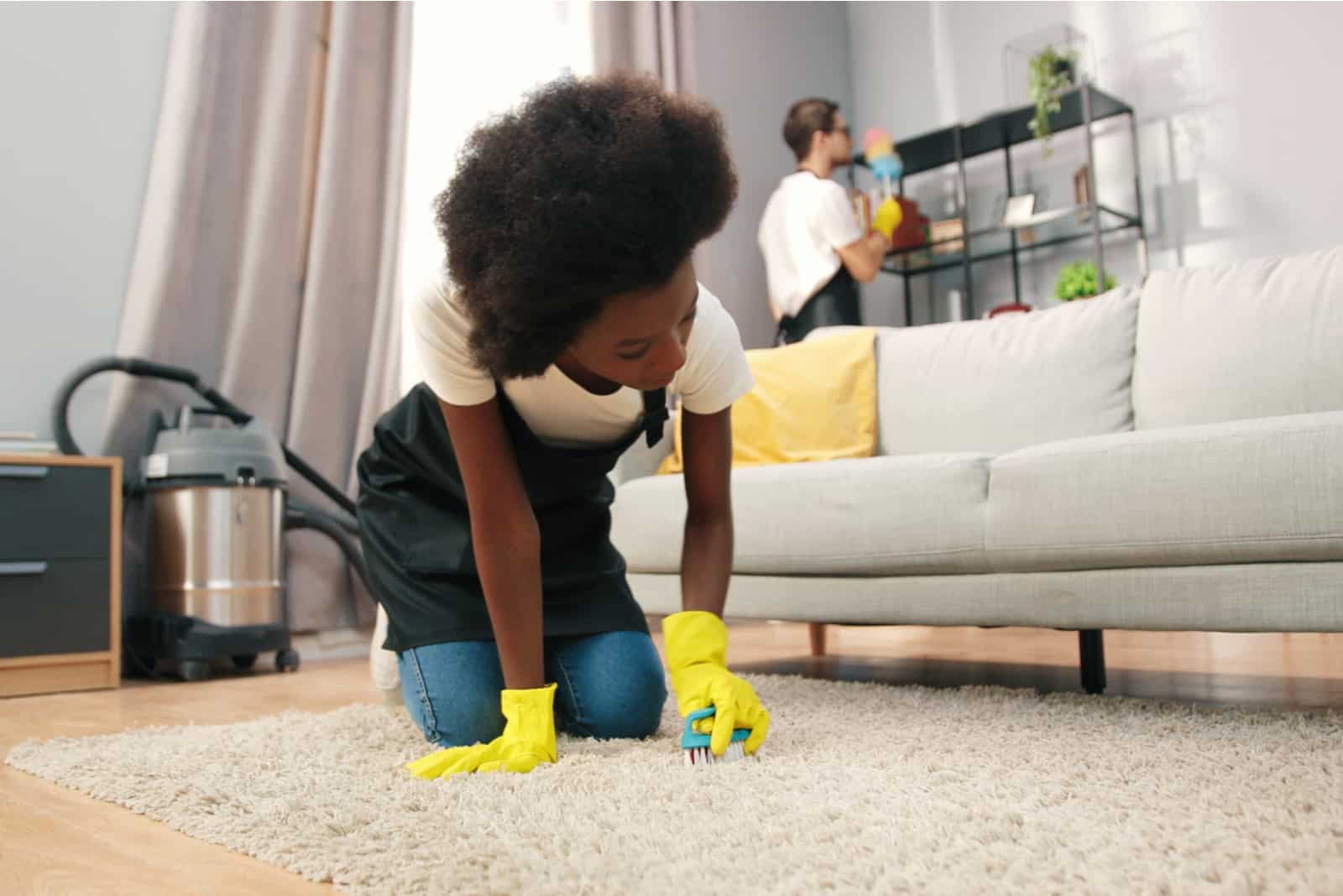
Tapeworm, roundworm, heartworm, and hookworm are all very common parasites for domestic cats. Nevertheless, very few pet owners will ever be cool with the idea of sharing their home with all types of worms.
The idea of having worms in your house is probably freaking you out! If you ever thought “My cat has worms how do I clean my house?” then stay tuned because we’re going to teach you everything you need to know.
Disclaimer: It might be a bit gross!
“My Cat Has Worms How Do I Clean My House?”- 7 Steps
The first step in dealing with a parasite problem is to visit the vet so you can get the proper dewormer. There is no point in cleaning the worm infestation if your cat is still carrying the parasite. Then you can proceed with other steps.
1. Wear a protective outfit
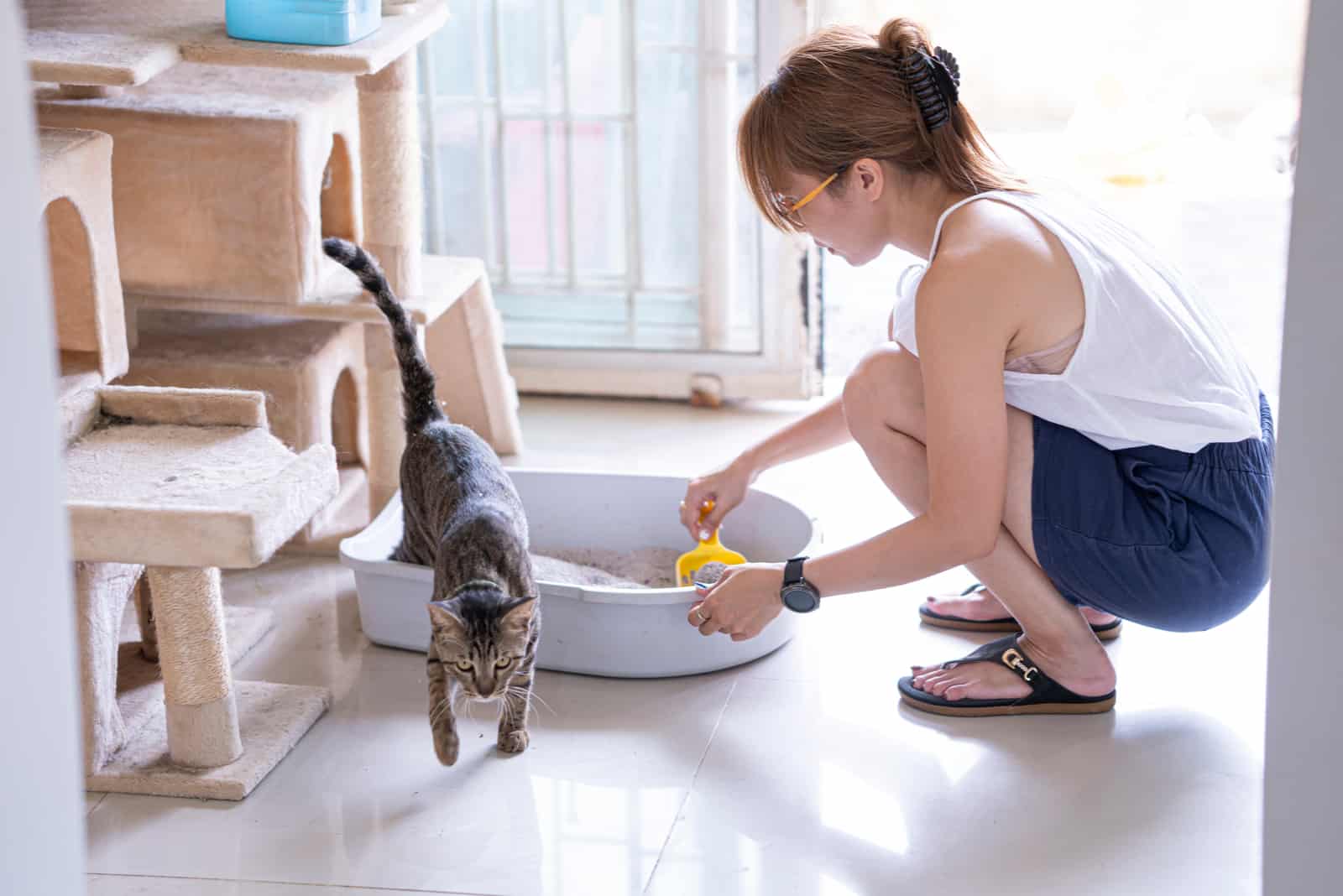
Never forget this step! No one wants to accidentally ingest roundworm eggs, not just because it is gross, but because it can have unpleasant consequences. We won’t go into details here, but humans can also carry these parasites when transmitted from a pet.
We recommend starting out with a N-95 rated dust mask, because roundworm and tapeworm eggs can be so miniscule that inhaling them by accident is a real possibility.
Protective rubber gloves are a no-brainer, but we recommend you go a step further and make sure that you wear rubber boots. Wearing one-piece clothing, like overalls, is also beneficial.
All in all, it is best if you wear old clothes that can be washed at a high temperature, because the safest thing to do after waging war on parasite eggs is to wash everything in a hot wash to get rid of any eggs..
2. Clean The Litter Box
Most of these worms, especially roundworms, are intestinal parasites, which means they spread through your cat’s feces. This is why deep cleaning your cat’s litter box is the number one priority!
Start by spraying some water on the dried feces. This will lower the chance of inhaling roundworm larvae.
Dilute some chlorine bleach in warm water and use this to disinfect the litter box and the area around it. Do not forget to apply the disinfectant to any additional equipment, like the scoop or shovel, or anything else that comes in contact with your cat’s poop.
The best thing for cleaning these utensils is to use boiling water. Just watch your hands!
3. Clean The Food Bowls
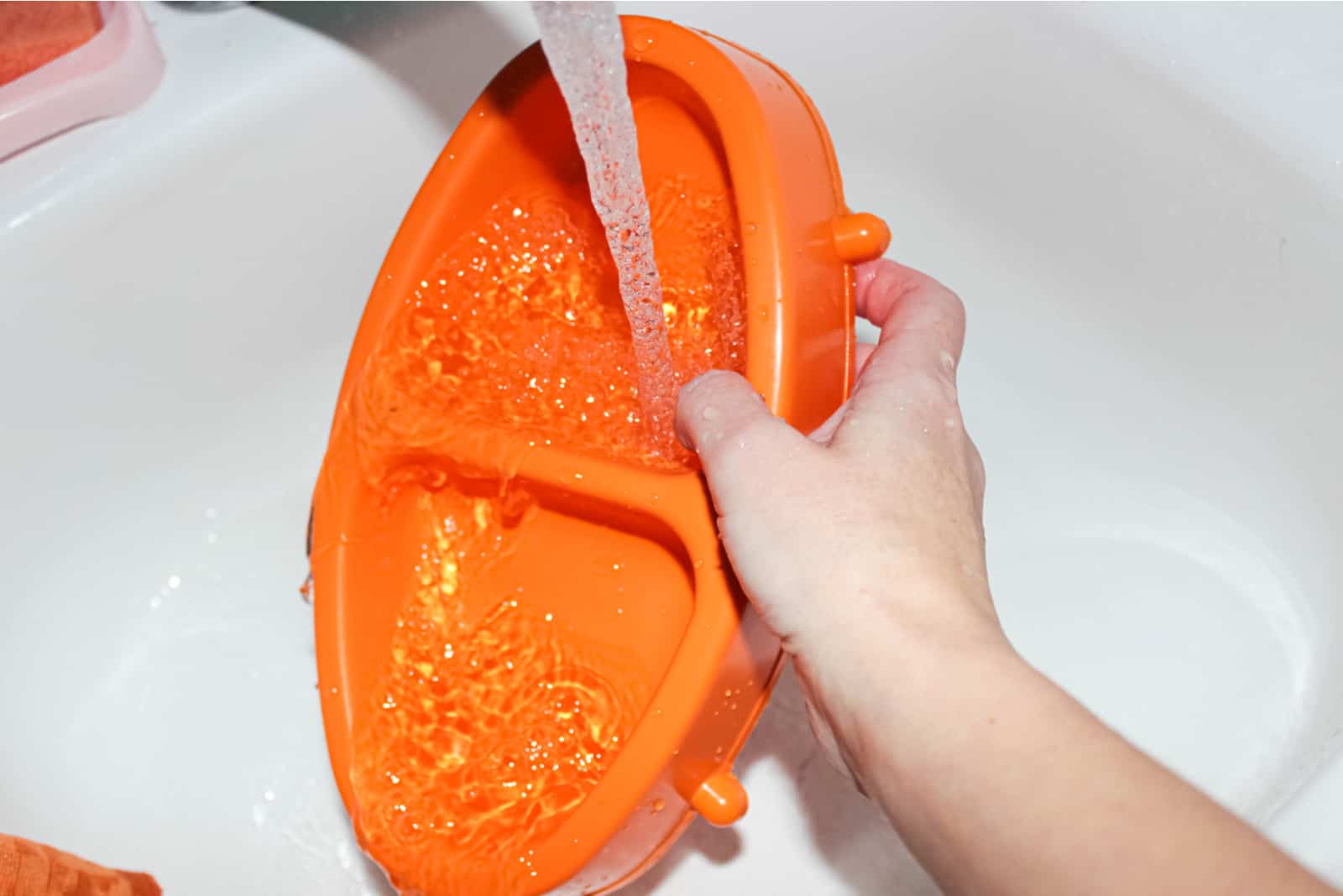
Naturally, it is important to disinfect your cat’s water and food bowls.
No cat owners want to spend time and money to deworm their cat, only to have them immediately ingest the parasitic larvae again.
We recommend you wash the bowls in hot water, with the help of soap and vinegar. You can also go a step further and use enzymatic cleaners, but be careful with these because they can damage your skin. Always rinse food and water bowls well.
If you use vinegar, leave the bowls for several minutes in the liquid, then proceed to rinse them out with hot water.
4. Clean The Cat’s Bed
If your cat is suffering from a worm infection, you have to make sure that their bedding is disinfected. Cat sleeping areas are a hotbed (pun intended) for parasitic larvae. This means that you will probably have to clean their bed and bedding daily for several weeks.
It is probably safest if you put all the bedding in the washer on high temperatures and with a lot of soap. You can get disinfectant laundry detergent that may give you extra peace of mind.
You will also need to isolate your cat from other pets and their beds until you are sure that the infestation has subsided. You might feel bad, but it has to be done!
5. Clean The Carpets

If you have carpeted areas in your home, and your cat is displaying symptoms of worms, you have to thoroughly clean your carpets.
Start with the vacuum cleaner, and then continue by wet washing it in soap, or some other carpet-safe cleaning product.
We also recommend using a steam cleaner if you want to be certain that your carpets are clean. It is always useful to own one, but it should be fairly easy for you to rent one if you don’t want to buy it.
This same process should also be used to clean your couches or other fabric furniture, even if your cat is not on them much – remember eggs can be carried in the air and land on other surfaces..
If you want to go all out on disinfecting your carpets, we recommend you use accelerated hydrogen peroxide. This solution will not damage your carpets or fabric, and it is a great disinfectant to use.
This is a non-toxic and non-irritating solution, which means that it is safe to use for you and around your pets. If the “my cat has worms how do I clean my house” question is heavy on your mind, accelerated hydrogen peroxide might be the solution. If in doubt, professional carpet cleaners are a safe and fast way to get everything effectively cleaned.
6. Clean The Hard Surfaces
First, if your cat has defecated in areas that are not around its litter box, make sure to clean up the fecal matter before doing anything else.
Keep it simple; use paper towels or old newspapers to pick up the cat’s stool, and proceed to burn or throw these in the bin.
Next, you will use the same bleach solution, along with some hot water, and give your hard surfaces a hearty scrub. We recommend you repeat this process often, to be certain all the eggs are disposed of before they can be ingested and become larvae.
Just in case, to be sure that all your house surfaces are clean, you can again apply boiling water. Pay attention to cleaning instructions for different surfaces to ensure you do not damage them by applying chemicals or hot water.
Of course, always be careful while working with hot water and chemicals. If it can destroy the pesky little devils, it sure can hurt you.
7. Clean The Outdoor Surfaces

If your indoor cat goes outside, it is important for you to clean their outdoor playing spaces. Indoor-outdoor cats carry a much greater risk of bringing in tapeworm and roundworm, since they are much more likely to consume fleas or other insects that can be the carriers of these parasites. This is especially true if there is a chance that they are mixing with cats outside of your household.
This means that if you let your cat play outside, you must keep the play area clean.
Do not use the garden hose or pressure washer! These are more likely to spread the parasite eggs into a wider area rather than destroying them.
Once again, bleach solution is your friend. Use it alongside a power washer and your cat’s outdoor playing area should be safe.
Again, on hard surfaces, pouring boiling water to rinse after cleaning is always a good idea. If there are some eggs left, boiling water will help you remove them. It will also remove any traces of cleaning chemicals that may be harmful to your cat’s skin.
7 Steps For Preventing Parasitic Infection And Reinfection
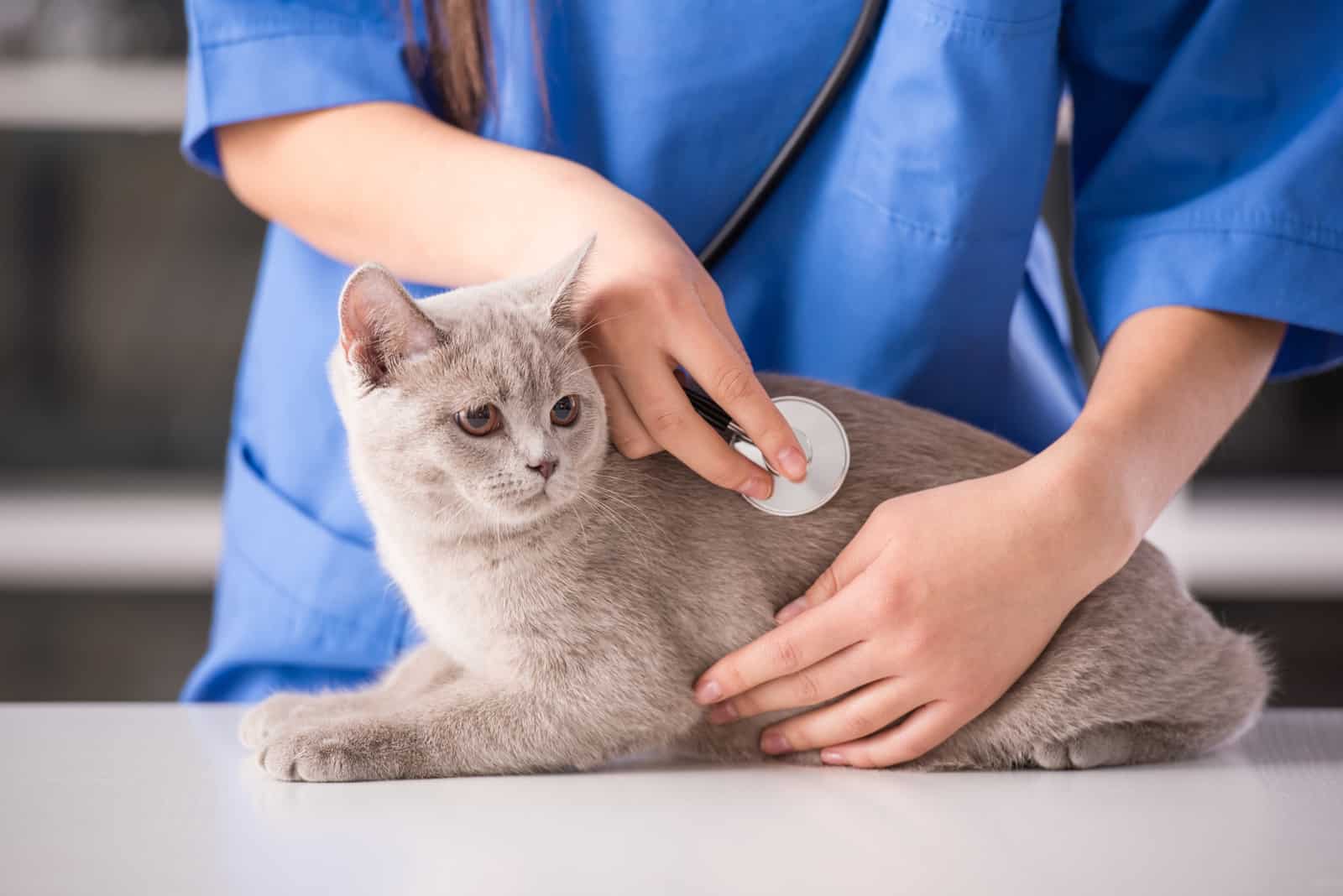
You have successfully cleansed your house and outdoor area of roundworms, tapeworms and other yucky intruders, so now is the time to learn how to prevent having to deal with them again!
1. Monitor The Outdoor Activities Of Your Indoor Cat
If your cat is allowed to play outside, you have to be ready to supervise them where possible. It would be best if you didn’t allow them to eat anything but the food you give them. Fleas, birds, rats, and mice often carry parasites like tapeworm, so keeping your cat away from such prey is your best bet.
2. Use Preventative Heartworm Medication
Visiting the vet should be a regular occurrence for taking care of your cat. However, if you do not have the time to visit the vet regularly, you have to make sure that you administer preventative heartworm medication to your cat.
Heartworms are the most dangerous type of worms for cats, and the infection can cause serious damage. If this can be prevented, then it is the responsibility of every pet owner to do so.
3. Groom Your Cat Regularly
Although cats mostly take care of their own grooming, it is advisable that you take the matter into your own hands at least once a week.
Parasite eggs can often travel on a cat’s fur, especially if you have a long-haired breed such as the maine-coon.
Use a flea comb and brush your cat weekly. It is best to do this outdoors so that any loose hair or parasite eggs don’t end up floating around your home.
4. Clean Up Your Living Area
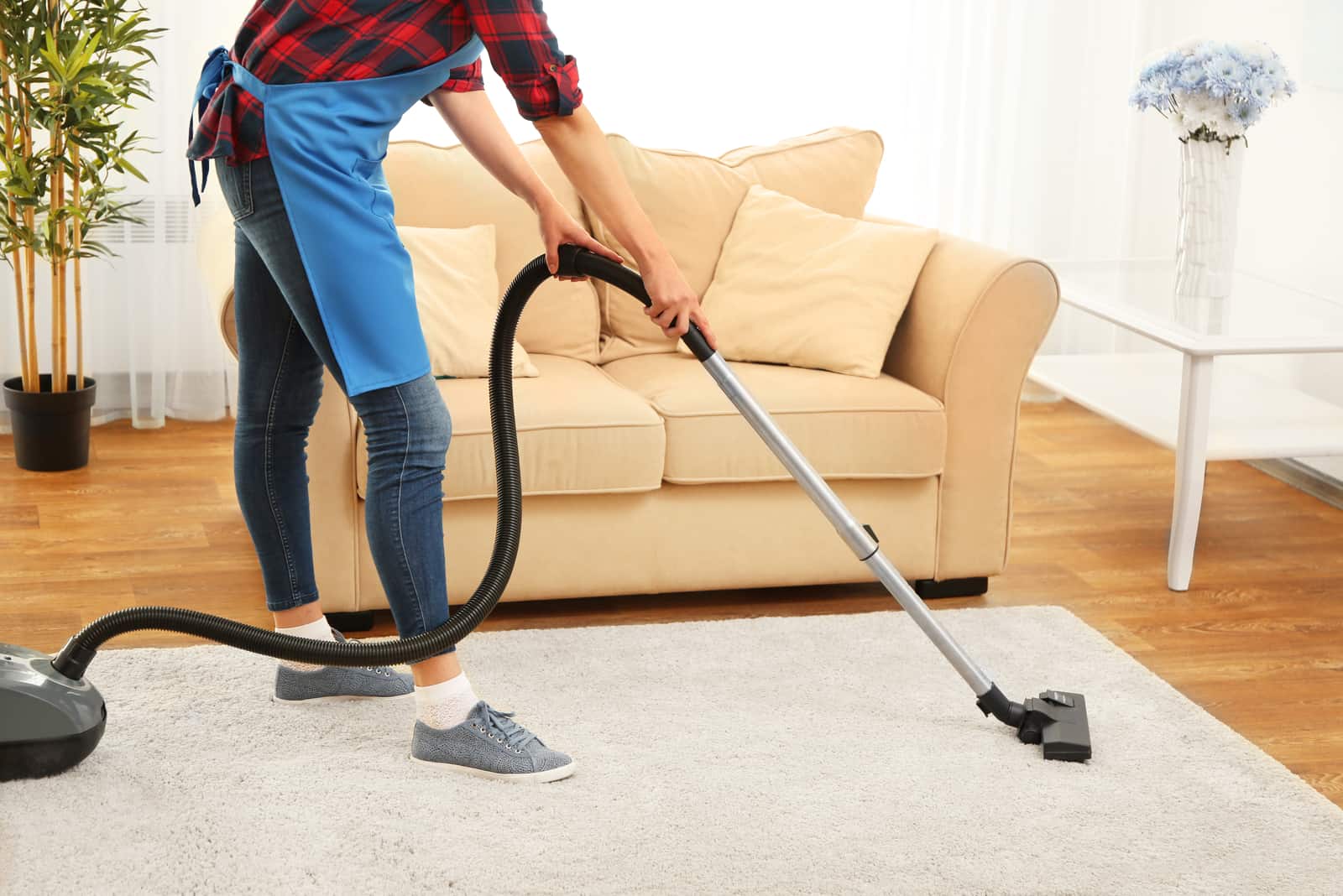
There is no way to completely avoid your cat bringing in parasite eggs, especially if it’s allowed to play outside.
That being said, if you clean your home regularly in the way we have discussed, you will manage to destroy the eggs or larvae early before it can escalate into an actual worm infection.
5. Use Flea Medication
If your cat gets infected by tapeworm, you can assume with a high degree of certainty that they probably got it from a flea. These insects are often infected with tapeworm, which then transfers to a cat’s gut when they are ingested.
Using flea medication could prevent the infection.
6. Isolate Your Infected Cat From Other Pets
If you have multiple cats in your home, you know how important personal possessions are for their autonomy. However, this is even more important if one of them is infected by worms.
If this happens, you MUST separate the infected pet from the other pets. Dealing with one pet that is infected by worms is hard, but dealing with multiple pets with the same problem is a nightmare as they will keep reinfecting one another.
As soon as you start noticing the symptoms of worm infection, take steps to ensure your other pets are not at risk of getting infected.
7. Regularly Clean Your Cat’s Litter Box
The eggs of parasites such as roundworm can stay dormant for months, and if you do not clean your cat’s litter box regularly, an infestation could escalate sooner than you think.
If there are infected feces in the litterbox, and they aren’t removed, the infection might spread to mites and fleas, which means your home is about to experience another infestation.
Please make sure you empty your cat’s litter box daily, and clean it at least once a week.
It’s a good idea to use a disinfectant often, to be certain it’s clean. Be careful if you’re using bleach!
Frequently Asked Questions
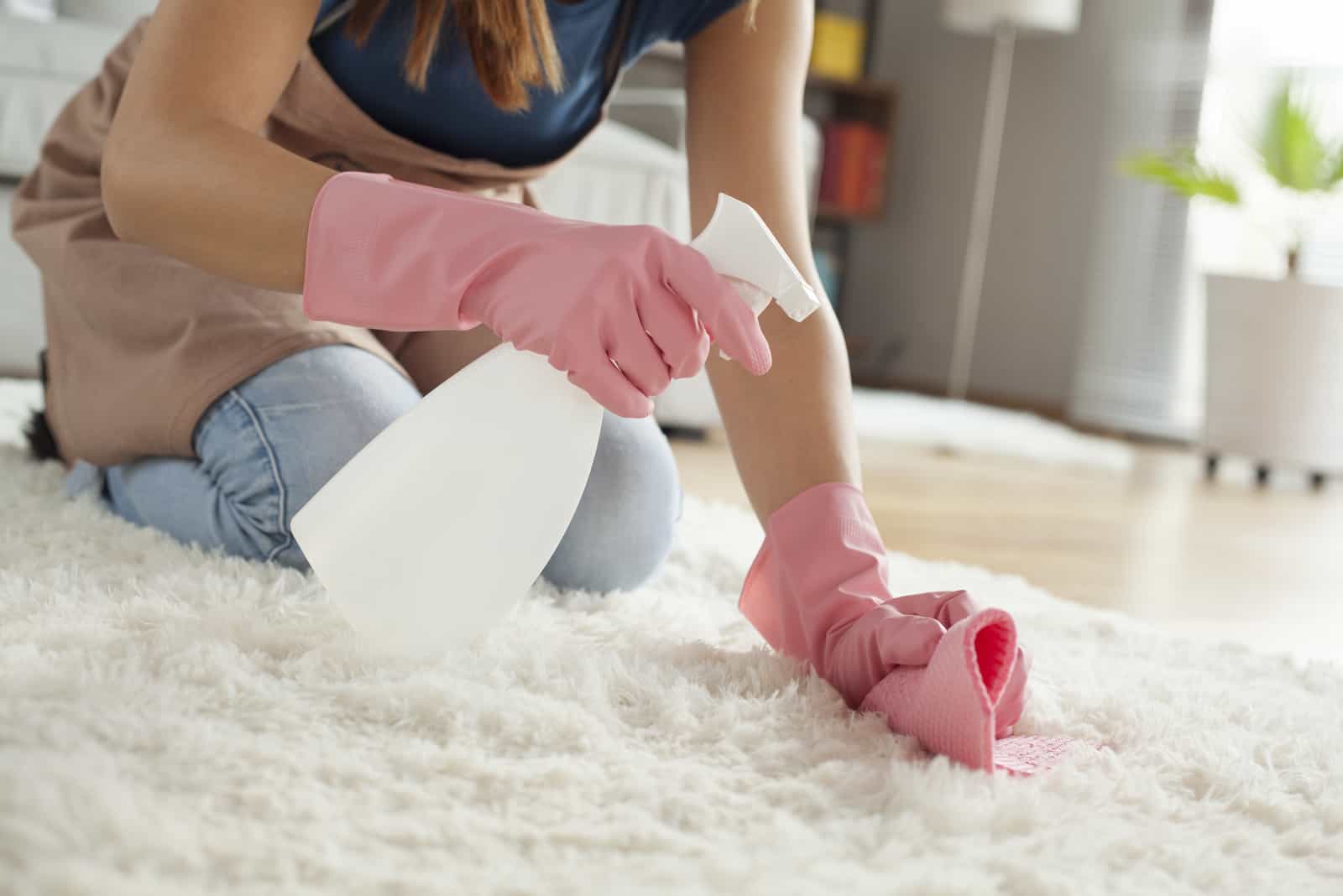
Can My Infected Cat Infect Me Or My Family?
Answer: Yes! It absolutely can! Most of these worms are rarely fatal to cats but can cause illness to people and pets that get infected. People with compromised immunity, like children, those with chronic illnesses, and the elderly should not be in the vicinity of an infected cat.
How Often Should I Give My Cat Deworming Medication?
Answer: To lower the risk of reinfection, you should administer proper deworming medication at least once every three months. Consult your vet on the deworming routine for your cat, but do not get complacent. Always check the instructions on the packaging of any medication.
The life cycle of some of these parasites is dependent on finding a cat host, so you can be sure that your cat is in danger of becoming one.
Can Worm Eggs Live In The Carpet?
Answer: They absolutely can! Carpets can often be a haven for parasitic eggs that are looking for a host. They could have arrived there in various ways.
Very often, the owner is to blame for bringing them in, especially if they spend a lot of time in the garden. Many owners bring in parasitic larvae on the heels of their boots.
Tapeworms, whipworms, roundworms, and hookworms are just some of the types of worms that are very comfortable waiting for their host in your carpet.
Other times, often in the case of roundworms, an infected cat scoots its bottom on the carpet, which spreads the larvae. Both worms and larvae can live in carpets.
This is why it is so important to clean your carpets well. Steam, soap, vacuuming, boiling water, salt, hydrogen peroxide – everything you can think of! If there are worms in your house, they will most likely be in your carpet.
How Long Can Worm Eggs Live In the Carpets?
Answer: A very long time! The physiognomy of some worm species allows them to survive a longer time, while some will die out earlier. Actually, if you have a semi-fuzzy carpet, and you don’t clean it regularly, there is probably a whole insect planet down there!
Coming back to the worms (yay!), not all species like the big blocks of fabric on the floor. Hookworms, for example, are not viable inhabitants of your carpet. They are not equipped to survive without a host for a long time.
So, if your cat has made a mess on the floor, and you know it has hookworms, you can just clean it up, since there is no risk that the larvae will plague your rug. Foer other worms, you will need to clean more extensively.
Of course, species like tapeworms and especially roundworms can survive without a host for a long time, which means that both they and their eggs can live in a carpet for months.
It is said that tapeworm larvae can survive on a carpet for eight months! That estimate rises to the possibility of years when it comes to roundworms.
How Long Can Worm Eggs Survive On Surfaces?
Answer: Similar to the carpets, some species can survive for very long periods on the surfaces of your home. However most prefer to be hidden in porous surfaces (like fabric), which can make it hard to remove them.
When dealing with them on non-porous surfaces (countertops), arm yourself with bleach, boiling water, vinegar, and get down to business. They can’t hide from you there!
Can Worms Live In The Bedding?
Answer: They can! Worms love warm porous materials, and what better place than a bed?
Of course, if your cat is not allowed to jump on, or sleep in your bed, the risk of having worms there is greatly reduced.
This is because many parasite eggs collect on the anus of the cat, which means that having an infected cat in your bed will often result in some new bedroom inhabitants.
Final Thoughts
“My cat has worms how do I clean my house” is a phrase that cannot be typed into a search engine without a feeling of dread.
Dealing with these disgusting unwanted guests can sometimes feel like an uphill battle. These resilient parasites can survive for many months in many different situations, which means that the risk of reinfection is always fairly high.
The best thing to do is to make sure that you prevent such situations by constant monitoring of your pet so you catch the problem as soon as possible.
If your cat’s feces are unusual, the cat seems fatigued, has suffered weight loss, or scoots its anus on a carpet, then you should probably take it to the vet and get professional advice.
Please do not delay the visit to the vet! We wish you the best of luck!






